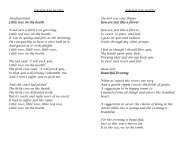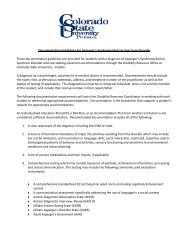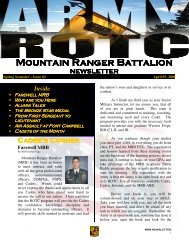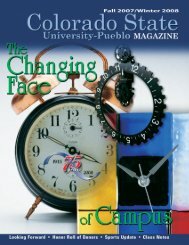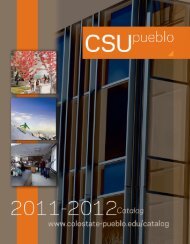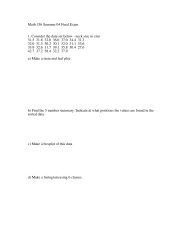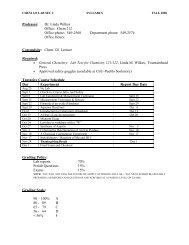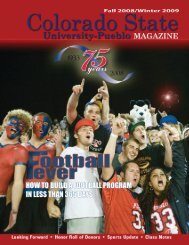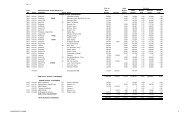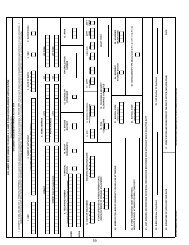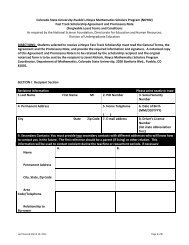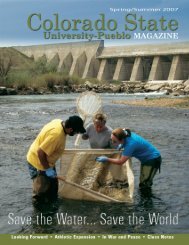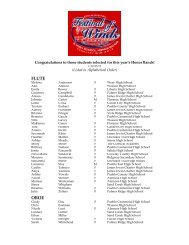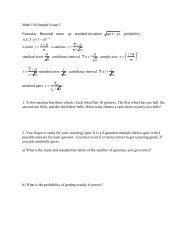2007-2008 Catalog (PDF) - Colorado State University-Pueblo
2007-2008 Catalog (PDF) - Colorado State University-Pueblo
2007-2008 Catalog (PDF) - Colorado State University-Pueblo
You also want an ePaper? Increase the reach of your titles
YUMPU automatically turns print PDFs into web optimized ePapers that Google loves.
Course Descriptions<br />
GRADUATE COURSES<br />
Limited to those enrolled in the Counselor Training<br />
Master’s degree, or permission of instructor.<br />
PSYCH 515 Psychology of Minorities 3(3-0)<br />
Designed to provide a systematic analysis of the forces<br />
that shape the behavior of minorities and consequent<br />
counseling methods with this population. (*)<br />
PSYCH 517 Life Span Development 3(3-0)<br />
Leads to a broad understanding of the impact of external<br />
influences on a person through the life span. Format<br />
includes exploration of topics of interest, discussion of<br />
research and active class participation (*)<br />
PSYCH 524 Philosophy and Theories of Counseling<br />
3(3-0)<br />
Designed to acquaint students with the range of theories<br />
currently directing the work of the counselor and to<br />
facilitate the development of a personal model of<br />
counseling. Personal professional ethics emerge as a<br />
major course focus. (*)<br />
PSYCH 525 Tools and Techniques of Guidance<br />
Services 3(3-0)<br />
Open to graduate students in the secondary school<br />
counseling program. A study of materials and methods<br />
used in secondary schools and of the counselor as a<br />
consultant and coordinator. The importance and role of<br />
the secondary school counselor will be the focus of this<br />
class. (*)<br />
PSYCH 526 Organizational Development 3(3-0)<br />
Designed to provide the graduate student with experience<br />
and skills necessary to improve programs and organization.<br />
(*)<br />
PSYCH 527 Group Counseling 3(3-0)<br />
Leads to an understanding of the function of group<br />
methods in the guidance program and assists the student<br />
in developing group facilitation skills. (*)<br />
PSYCH 528 Career Development 3(3-0)<br />
Designed to help students gain insight and understanding<br />
of the development process of occupational decision.<br />
Explores career counseling provided by counselors for<br />
clients in the areas of future education and in the world of<br />
work. (*)<br />
PSYCH 530 Family Therapy 3(3-0)<br />
This course is an introduction to Family Systems Theory.<br />
Emphasis is on the history and development of treatment<br />
models in family interventions and techniques. Prerequisite:<br />
graduate standing. (*)<br />
PSYCH 536 Practicum 3(3-0)<br />
Designed to provide the beginning counseling student<br />
with basic interpersonal training experience. Individual<br />
and group contact focuses on personal growth and skill<br />
development. (*)<br />
PSYCH 538 Elementary Counseling 3(3-0)<br />
Designed to provide methods and techniques for<br />
elementary school counselors. (*)<br />
PSYCH 546 Assessment in Counseling 3(3-0)<br />
This course provides students with an understanding of<br />
group and individual educational and psychometric<br />
theories and approaches to appraisal. Prerequisite:<br />
graduate standing. (*)<br />
PSYCH 563 Psychopathology of Childhood 3(3-0)<br />
Unique conceptual models of etiology, assessment, and<br />
therapy appropriate to psychological disorders of childhood.<br />
Graduate students complete an independent project<br />
and consider treatment and management techniques.<br />
Prerequisites: graduate standing, permission of instructor<br />
and PSYCH 362 or equivalent. (*)<br />
PSYCH 591 Special Topics (1-3 VAR)<br />
Prerequisites: graduate standing and permission of<br />
instructor. (*)<br />
PSYCH 592 Research 3(3-0)<br />
Designed to assist students with the knowledge and skills<br />
necessary for a consumer of research. The fundamentals<br />
of research procedure and analysis of statistics are<br />
stressed. (*)<br />
PSYCH 595 Independent Study (1-3 VAR)<br />
Prerequisites: graduate standing & permission of<br />
instructor. (*)<br />
PSYCH 598 Internship 3(0-3)<br />
Designed to provide the student with actual field work<br />
experience in counseling and guidance. (*)<br />
READING (RDG)<br />
UNDERGRADUATE COURSES<br />
RDG 099 Development Reading Skills 3(3-0)<br />
Students will apply strategies for improving comprehension,<br />
developing vocabulary, and increasing rate for<br />
reading college textbooks. (S/U grading) (F,S)<br />
RDG 301 Reading and Language Arts in the<br />
Elementary School 3(3-0)<br />
Foundations of reading and language arts including<br />
psychology of reading, language development, emergent<br />
literacy, word attack, comprehension strategies, vocabulary,<br />
hand-writing, spelling, written and oral language<br />
skills. (F,S)<br />
RDG 310 Current Approaches to Reading and Writing<br />
Instruction 3(3-0)<br />
Various approaches to teaching reading and writing<br />
including research findings and classroom application of<br />
the reading and writing process. Prerequisite: RDG 301 or<br />
425. (F)<br />
RDG 360 Practicum (1-3 VAR)<br />
Work with small groups and individual pupils in the public<br />
school preparing materials and lessons under the<br />
supervision of a reading teacher. Applies to both<br />
elementary and secondary schools depending upon the<br />
instructor’s assignment. Prerequisites: RDG 301 or 425<br />
and initial testing in basic competencies. (F,S)<br />
RDG 410 Teaching Rdg and Language Arts 4(4-0)<br />
Includes reading and language arts instruction, emphasizing<br />
methods and assessment strategies to meet K-6<br />
<strong>Colorado</strong> content standards; 30 hours of field experience.<br />
Prerequisite: admission to Education. (F,S)<br />
RDG 425 Teaching Reading in Content Areas 3(3-0)<br />
Reading skills, strategies and activities to improve<br />
comprehension of textual material in various content<br />
areas such as mathematics, science, literature, social<br />
sciences, and industrial education. (F,S)<br />
RDG 431 Developing Creative Centers 1(1-0)<br />
Involves planning, developing and implementing the use<br />
of learning centers in the classroom. Prerequisite: RDG<br />
301 or 425. (SS)<br />
249



